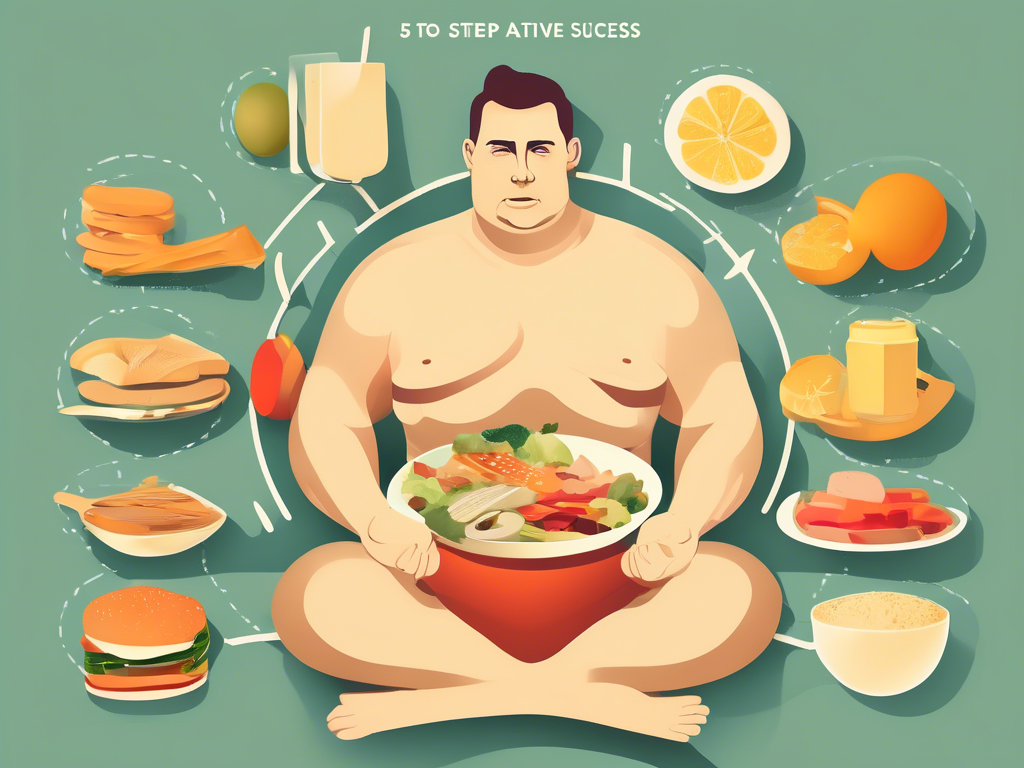The Bottom Line:
- Discover the subconscious connection between emotions and overeating
- Pinpoint specific triggers that lead to overeating behaviors
- Practice mindful eating to tune into body cues and prevent overconsumption
- Implement meal planning to avoid impulsive decisions and promote accountability
- Focus on hydration, protein, fiber, sleep, and stress management for overall wellness
Identify the Role of Food in Your Life
Understanding the role that food plays in your life is crucial to overcoming overeating and achieving fat loss success. Take the time to identify the story connected to your eating habits and delve into the nature of your relationship with food.
Discovering Subconscious Connections
For example, consider Alex, who found comfort and safety in food due to a tumultuous childhood. Unknowingly, he used food to escape from stress and pressure, creating a subconscious connection between certain foods and emotional comfort. This showcases how food can serve as a coping mechanism without us even realizing it.
Bring Awareness to Your Relationship with Food
By journaling, meditating, or seeking guidance from experts, you can uncover the reasons behind your overeating tendencies. Recognizing whether you turn to food for comfort, security, celebration, or other reasons is the first step towards regaining control over your eating habits.
After identifying the role food plays in your life, the next step is pinpointing your triggers. These triggers could be stress, specific emotions, routines, or environmental cues that prompt you to overeat. By understanding and acknowledging these triggers, you can start taking proactive measures to manage them effectively.
Embrace Mindful Eating
Practice mindful eating by being fully present during meals. Avoid distractions like TV or phones and focus on the sensory experience of eating. Mindful eating helps you tune into your body’s cues, such as hunger and fullness, reducing the chances of overeating due to mindless consumption.
Planning your meals ahead of time can also prevent impulsive eating decisions. Whether through meal prepping, creating a menu, or ordering consciously, having a meal plan enhances accountability and supports healthier eating habits.
Lastly, prioritize hydration, adequate protein and fiber intake, quality sleep, and stress management. These factors are crucial for regulating appetite, energy levels, and overall well-being, contributing to a balanced approach to nutrition and weight management. By incorporating these steps into your routine, you can empower yourself to overcome overeating and achieve sustainable fat loss goals.
Recognize Triggers for Overeating
Uncover Emotional Triggers
Once you have identified the role that food plays in your life, it’s essential to delve deeper into your emotional triggers for overeating. These triggers could stem from stress, specific emotions, routines, or environmental cues that prompt you to indulge in excessive eating. By recognizing these triggers, you gain insight into the underlying reasons behind your overeating tendencies.
Embrace Awareness and Reflection
Practicing mindfulness can help you become more aware of your eating habits and emotional responses to food. By being present during meals and reflecting on your interactions with food, you can develop a better understanding of how external factors influence your eating behavior. Incorporating mindfulness techniques into your daily routine can empower you to make conscious choices around eating and curb overeating episodes.
After identifying your triggers and cultivating mindfulness, the next step is to proactively manage these triggers by implementing coping strategies. This may involve seeking alternative ways to address emotional needs, such as engaging in physical activity, practicing relaxation techniques, or seeking support from friends or professionals. By developing healthier coping mechanisms, you can reduce the reliance on food as a source of comfort or distraction.
Practice Mindful Eating Techniques
Understand Your Relationship with Food
Identifying the role that food plays in your life is crucial to overcoming overeating and achieving fat loss success. By delving into the story connected to your eating habits and exploring the nature of your relationship with food, you can gain valuable insights into your behaviors and triggers.
Uncover Subconscious Connections
Take Alex, for example, who found comfort and safety in food due to a tumultuous childhood. Unknowingly, he used food as a coping mechanism to escape stress and pressure, forming subconscious connections between certain foods and emotional comfort. This demonstrates how food can serve as a powerful tool for emotional regulation without our conscious awareness.
Building awareness around the emotional role of food in your life is the first step in understanding and addressing overeating tendencies. By journaling, meditating, or seeking guidance from professionals, you can uncover hidden triggers and patterns that drive your relationship with food.
Practice Mindful Eating Techniques
Embrace mindful eating as a transformative practice in overcoming overeating. By being fully present during meals, free from distractions like TV or phones, you can focus on the sensory experience of eating. Mindful eating helps you tune into your body’s cues, such as hunger and fullness, reducing the likelihood of overeating due to mindless consumption.
Planning your meals ahead of time can also mitigate impulsive eating decisions. Whether through meal prepping, creating a menu, or consciously ordering meals, having a structured meal plan enhances accountability and supports healthier eating habits.
Hydration, adequate protein and fiber intake, quality sleep, and stress management are additional factors essential for regulating appetite, energy levels, and overall well-being. Prioritizing these components contributes to a balanced approach to nutrition and weight management, empowering you to overcome overeating and achieve sustainable fat loss goals.
Plan Meals Ahead for Success
Delve into Your Emotional Triggers
After understanding the role that food plays in your life, it’s crucial to delve deeper into your emotional triggers for overeating. These triggers could stem from stress, specific emotions, routines, or environmental cues that prompt you to indulge in excessive eating. By recognizing these triggers, you gain insight into the underlying reasons behind your overeating tendencies.
Implement Meal Planning for Success
Planning your meals ahead of time can be a game-changer in preventing impulsive eating decisions. Whether through meal prepping, creating a menu, or consciously ordering meals, having a structured meal plan enhances accountability and supports healthier eating habits. This proactive approach can help you stay on track and make mindful choices when it comes to your nutrition.
Hydration, adequate protein and fiber intake, quality sleep, and stress management are all key components that contribute to regulating appetite, energy levels, and overall well-being. By prioritizing these factors in your daily routine, you can create a balanced approach to nutrition and weight management, ultimately empowering yourself to overcome overeating and achieve sustainable fat loss goals.
Focus on Hydration, Protein, Fiber, Sleep, and Stress Management
Focus on Essential Components for Success
When striving to overcome overeating and achieve fat loss success, focusing on hydration, protein intake, fiber consumption, quality sleep, and stress management is key. These fundamental aspects play a crucial role in regulating appetite, energy levels, and overall well-being, leading to a balanced approach to nutrition and weight management.
Hydration: The Foundation of Well-Being
Hydration is often overlooked but plays a significant role in curbing overeating. Many times, feelings of hunger are actually signals of dehydration. By staying adequately hydrated throughout the day, you can reduce unnecessary food cravings and maintain optimal body function. Make it a habit to drink water regularly to support your overall health and prevent mindless snacking.
Protein and Fiber: Power Duo for Satiety
Ensuring an adequate intake of protein and fiber in your diet is essential for promoting feelings of fullness and satisfaction after meals. Proteins and fibers take longer to digest, keeping you satiated for longer periods and helping control overeating tendencies. Incorporate lean proteins like chicken, fish, or tofu and fiber-rich foods such as fruits, vegetables, and whole grains into your daily meals to support your weight management goals.
Prioritize Quality Sleep for Optimal Health
Sleep plays a critical role in regulating hormones that influence appetite and metabolism. Lack of sufficient rest can disrupt hormone balance, leading to increased cravings for high-calorie, sugary foods. Aim for 7-9 hours of quality sleep each night to support your body’s natural rhythms and promote healthy eating habits. Establishing a consistent bedtime routine and creating a comfortable sleep environment can help improve your sleep quality and overall well-being.
Effective Stress Management Strategies
Stress can trigger emotional eating and contribute to overeating episodes. Developing effective stress management techniques such as mindfulness, meditation, yoga, or deep breathing exercises can help you cope with daily stressors without resorting to food for comfort. Identifying your stress triggers and implementing proactive strategies to address them can prevent emotional eating and promote healthier coping mechanisms.
By incorporating these essential components into your daily routine, you can enhance your ability to overcome overeating, achieve sustainable fat loss, and maintain a healthy relationship with food. Prioritizing hydration, protein, fiber, sleep, and stress management is fundamental to supporting your overall well-being and reaching your weight management goals.





